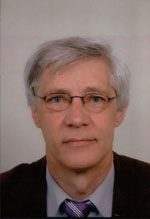Royal decoration for Herbert Löhner

Prof. H. (Herbert) Löhner (Germany, 1947) will receive a Royal Decoration on 30 November from deputy mayor E. Zwart of the municipality of Bedum. Löhner will be made a Knight in the Order of the Netherlands Lion.
The decoration will be presented at 12 noon during a symposium organized at the Hampshire Hotel Plaza, Laan Corpus den Hoorn 300, Groningen, in honour of his retirement.
Experimental Physics
Löhner joined the Kernfysisch Versneller Instituut (KVI) of the University of Groningen in 1988. In 1993 he became professor of Experimental Nuclear Physics with a special interest in hadrons. His research concentrates on the composition of and the interaction between nuclei and other small particles. He always organized his research within strongly international cooperations and conducted many experiments at major international research centres such as CERN (Switzerland), GANIL (France) and ELSA (Germany). This has resulted in a significant international and national reputation. In recent years, Löhner shifted his focus to astro-particle physics, a new field on the interface between astrophysics and particle physics which has become very popular internationally. To this end he conducted research with a huge underwater telescope in the Mediterranean Sea (ANTARES), which scanned the universe in search of the sources of neutrinos.
International research
Löhner was intensively involved in the international research school FANTOM – from 1998 to 2003 as a member of the board and from 2003 to 2005 as the director – and thus raised the international education of PhD students to a higher plane. FANTOM is an international research school in the field of nuclear and atomic physics. In 1994 it was the first – and for a long time the only – research school in the Netherlands that operated in an international setting.
Although Löhner was mainly involved in fundamental research, he was also very interested in the uses to which that technology was put. For example, he has made an important contribution to research in the field of medical technology by developing instruments that will significantly improve the positioning sensitivity of PET and MRI scanners. He is also known as one of the leading figures behind the development of the TAPS detector, specially designed to measure photons with great accuracy. He also played an important and leading role in the design of the Electromagnetic Calorimeter, part of the PANDA detector that is going to form part of the new FAIR accelerator facility in Darmstadt.
Motivational teacher
Löhner has always contributed with flair to the development and teaching of physics at the University. Characteristic of his style of teaching is the high content-related and didactic standard as well as his enthusiasm. In 2005 his extraordinary gifts and dedication were recognized by the Faculty of Mathematics and Natural Sciences Teaching Award.
Löhner was always strongly in favour of a new Bachelor’s and Master’s curriculum when deputy director of the Physics section of the Programme Committee and Faculty Board member. He was also involved with the setting up of a Master’s specialization in Physics Instrumentation and Computing Science.
Löhner feels a strong need to interest young people in physics and technology. One important social motivation for him is that in the Netherlands, relatively few young people choose an exact science and that society and the economy thus miss out on a potentially wide range of technologically trained young people. Löhner is thus a proponent of attractive teaching to interest young pople in a career in physics and technology. He has organized demonstration installations on numerous occasions, guided groups around, given special lessons at secondary schools and designed information material.
Discovery Truck
Löhner has frequently been a guest lecturer in the Discovery Truck, the travelling laboratory-cum-lecture room of the Faculty of Mathematics and Natural Sciences of the University of Groningen. This truck travels to secondary schools to make school pupils enthusiastic about science and technology by letting them conduct experiments and come into contact with scientists.
One of Löhner’s most important feats was his involvement in the organization of activities within the framework of the ‘World Year of Physics’ in 2005, both in Groningen and in the rest of the Netherlands. Tirelessly and with great creativity, he designed memorable activities such as physics ‘tastings’ in shops, the Magdeburger hemispheres on the Grote Markt, Foucault’s pendulum in the Martinikerk and the ‘Fietsica’, where people could take bicycle-related energy tests.
More news
-
27 November 2025
Aeroplane spotting using a radio telescope
-
26 November 2025
Why are shiny colours rare yet widespread in nature?
